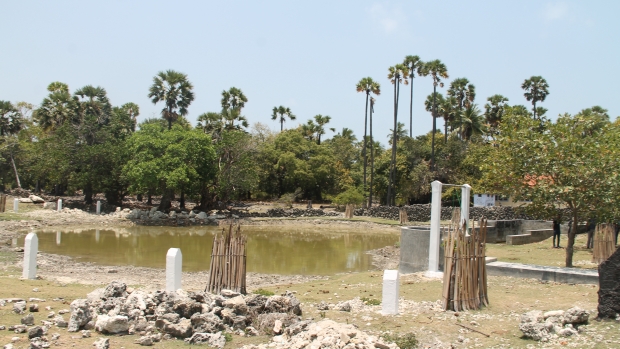Grants :: Small Grant Facilities :: Phase 3 SGF Projects LK :: Mapping of ponds / waterholes and restoration of a selected pond in the Delft Island
Mapping of ponds / waterholes and restoration of a selected pond in the Delft Island

Thondachchi kulum tank being restored , Delft Island © Kumudini EKARATNE
Objectives
1.Survey of the available ponds/waterholes in Delft Island, and documentation of their characteristics,including physico chemical parameters.
2. Restoration of a selected pond using accepted ecological and hydrological principles as a model
Background
The Delft Island known as Neduntheevu, located in the Palk Strait in the Northern region of Sri Lanka is the second largest island, being 50 km2 in an area. The island has the largest human population of all the islands located around the Jaffna Peninsula. It had a population of around 12,000 in the 1960, which declined to around 6, 200 in 1981. During the 1990’s, when the northern conflict was at its peak, many people were displaced from the island. In 2007, Delft had an estimated population of 4,124 persons, all of whom were Sri Lankan Tamils. Following the conclusion of the war, people have begun to return to Delft, gradually. Therefore, its current population comprises of approximately 4,800 persons, belonging to 1,468 families. Given this framework, the government plans to develop the agriculture, livestock and tourism sectors in Delft Island.
Fresh water scarcity for drinking, agriculture and other purposes is the major problem among the communities in Delft Island. Delft Island is situated in the dry zone of Sri Lanka and gets an average annual rainfall of 750 mm, the main cause is prolonged dry season. The island receives peak of rainfall (exceeding 100 mm per month) in two monsoon seasons, one is northeast monsoon, between October and December and other is southwest monsoon, between April and May. Therefore, Delft experiences a prolonged dry season occurring for over six months of the year. An acute scarcity of water is experienced during the peak of the dry season.
Being an island, salt water intrusion is another crucial problem for Delft; people obtain water from shallow wells and water along the Delft Island is slightly brackish: this is another cause of water scarcity problem, as well as the sandy nature of soil.
The project will undertake the identification of all available ponds/waterholes on Delft Island, and will report the water quality of those ponds. The survey of existing ponds has important results for policy-makers to identify suitable ponds to augment water supply in the Island, which is a crucial need. One small pond will be restored as a model through widening, bund raising, cleaning up the pond’s barrier and blocking seepages in bunds. Nearby local communities will be able to get fresh water and store rain water, in order to increase the access to safe water for domestic purposes. The resulting report will be a baseline to mitigate the water scarcity problems for Delft Island farmers and local communities.
Target beneficiaries
Direct beneficiaries of the project are farmers and local communities, whereas the documentation of the findings will create benefits for researchers, water conservationists, University students, teachers and school children.
Outputs
- Geo-location of all the ponds and waterholes on Delft Island.
- Water quality measurements of ponds and waterholes assessed during wet and dry season.
- GIS mapping of the ponds and water holes’ location and water quality parameters.
- The selected pond (Thoddichcha kulum) was restored by deepening, widening, desalting and cleaning: it increased the water stagnating capacity from 440 m3 to 880 m3.
Accomplishments and challenges
Accomplishments:
The survey of existing ponds had important results for policy-makers to identify suitable ponds to increase the water supply on the Island, which is a crucial need.
- Identification of 23 non saline ponds
- Identification of 2 saline ponds
- Identification of 12 ponds with intermediate salinity
- Identification of 9 non saline waterholes
- Identification of 1 saline waterhole
- Identification of 13 saline waterholes with intermediate salinity
Challenges:
- Few ponds were not accessible during the rainy seasons, as the roads were flooded.
- The researchers were not able to collect mud samples from all ponds, as some of them were with rocky bottoms.
- In terms of project management, the local capacity has been found to be quite inadequate; personnel for project management have largely come from Jaffna: their time spent on the island depended on the ferry schedule from the Peninsula. Accommodation is extremely limited and transportation costs are high. These limitations pose challenges to timely implement the project to the standards required.
Contributions to cross-cutting themes
Climate change:
Delft island receives about 80% of its annual rainfall from the NE monsoon and (Nov – Jan). The pilot initiative of restoring a pond which is likely to store water for extended periods for human and livestock consumption contributes to mitigating adverse effects of climate change.
Gender integration:
Water availability addresses a key issue for women who fetch water from distant places currently. Furthermore, improved water table is likely to provide opportunities for women to engage in agriculture.
Property rights and resource tenure:
The project will facilitate community access to water.
Lessons Learned
The refurbished model pond (Thondachchi Kulum ), handed over to the Department of Agrarian Development, appears to be not the choice of the community. There is no community-based management system or maintenance arrangement: the lack of stakeholders’ engagement is evident.
The Grantee should have had an on-going relationship with the beneficiary community, and should have facilitated a mechanism, together with the Department of Agrarian Development to ensure that the pond is well maintained for community use.
Project Facts
Country
Location
Delft Island
Topic
Duration
1st Jan 2016 to 31st Dec 2016
Co-financing Partner
USD 1,368
Implementing Partner
Department of Fisheries, University of Jaffna
Prof. Mrs. Sivashanthini Kuganathan
Head, Department of Fisheries
021 222 2307 (TP: Office)
077 666 0 669 (TP: Mobile)
sivashanthini@gmail.com